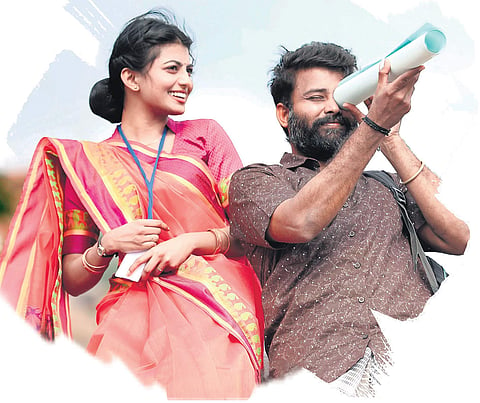

Kurangan will be a popular name to even someone with a superficial knowledge about the Tamil indie music scene. Tenma was the music producer and guitarist of the now-defunct band. If not a wave, Tenma did create ripples in the indie scene by starting Madras Indie collective, an attempt to bring together all the indie musicians under one roof. He later teamed up with filmmaker Pa Ranjith and started the Casteless Collective, and as the next step in his journey, Tenma has entered Tamil cinema with Ranjith’s upcoming production venture, Irandam Ulaga Porin Kadaisi Gundu, directed by Athiyan Athirai.
Ahead of the film’s release date, December 6, we talk to Tenma about Gundu, Pa Ranjith, and the current state of the Tamil indie music scene.
How was the experience working with the Gundu team and Pa Ranjith?
Initially, I did a skeleton of the background music for the film and they liked 60 percent of it. But I was very happy. So, that’s how it began. I have sonically built a character for the Gundu (bomb). When Ranjith sir heard it, he said that it was interesting but he doesn’t understand it. He remarked that it was very fresh. He suggested a few changes and I realised that he has incredible knowledge about all the departments of cinema. Everyone seems to forget that Pa Ranjith is a brilliant filmmaker.
What does that Gundu symbolise?
It means a lot of things. But to put it simply, if a bomb goes off, the definitions, caste, creed, religion, pride, and everything else of a person are just gone, right? So, Gundu is an important tool!
Is music just a tool for you to share ideas or do you love music as a form?
It might sound cliched, but music is the language of emotions. It is said that you can understand a person by looking at his playlist. For me, it is a beautiful communication tool. At one period, music got defiled by the aesthetics, which put a lot of rules to it. I hate the divinity associated with music; it shouldn’t be romanticised like that. Music should be available to everyone. Personally, music is just escapism for me. I was very uncomfortable with my reality. Music was therapeutic for me.
So, your journey has been a painful one. Do you feel happy that you have entered films?
I am happy that it is this film because one of the biggest privileges of me is that I know Ranjith sir personally. He is a complete visionary. The film’s director Athiyan Athirai, hailing from the same school of thought, is another brilliant human being. So, I am glad that my debut is with this team.
In addition to making movies, Ranjith is developing a community with Neelam Productions, The Casteless Collective, and Koogai. How important are these things for an artist like you?
I am the kind of artist, who shouldn’t be in the mainstream. I even convinced myself that I don’t want to be in the mainstream. But Ranjith sir told me ‘you need to exist, it is very important that you exist’. He validated many people like me with The Casteless Collective and Neelam Productions. If not for Pa Ranjith, there is no Tenma here. I would have been somewhere else.
As an indie musician, do you think our cinema has shackled music because about 90 per cent of what we hear is only cinema music?
Indie music should not compete with cinema, a giant that is also an integral part of this country. It is so influential that it tells you what to wear and how to look. So, after entering the cinema industry, I don’t want to call myself an indie artist because I am part of the mainstream now. I have privileges and I shouldn’t steal the spotlight from indie artists. I should respect the other side. Now, I would like to be called as an alternative artist.
How is the Tamil indie scene now?
It is far better than what it used to be before. Everyone is creating an identity for themselves and it is relatively easy to be an indie artist now as compared to a few years ago. We have bands like Otha Sevuru, which is a complete package! Also, there is Siennor, who tells important ideas
in his songs like Aval Oru Puriyatha Pudhir and Unmai Enge.
What do you do with the art of problematic people?
It is just that — problematic people, not problematic art. Sometimes art doesn’t dictate the artist’s story alone. It dictates his society and politics around him; he probably wrote it better. Also, problematic people are everywhere. For example, if the best neurosurgeon in the world, who has few cases against him, is going to take a bullet out of your cranium, you are not going to say no to him. Why I am using ‘he’ here is because most of the time it is ‘he’ who is problematic than ‘she’.
What does ‘Tenma’ mean?
I didn’t want caste, religion and the identity given to me at birth. I didn’t want my family name because that’s a different person. He lived without knowing anything. Tenma at least knows something. I read this Manga book called Monster. The protagonist’s name is Kenzo Tenma, a very hopeful character. I love him. So, I named myself after him.”